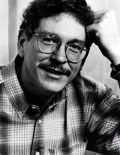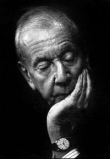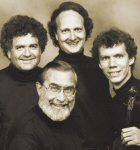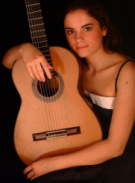Capitol Woodwind Quintet: 30 and Still Wailing
December 5, 2006
__________________________________________________________________________
The Washington Post 12/05/06: You might expect the Capitol Woodwind Quintet to be slowing down a bit after three decades of playing together. Not to worry. The venerable ensemble launched its 30th anniversary season on Sunday at Temple Micah with a performance as fresh and stimulating as always, delivering everything from repertoire staples to foot-stomping klezmer.
Eric EwazenAn unabashedly melodic work by Juilliard composer Eric Ewazen, his "Cumberland Suite" from 2004, opened the program. It's a beautifully crafted and utterly unpretentious piece: sweeping, inventive and steeped in Appalachian folk melodies, with none of the sharp elbows usually found in Serious Academic Music. Music like this can often seem hokey or (horror of horrors) derivative, and "Cumberland" does get perilously cinematic in spots. But Ewazen's directness -- not to mention his exceptional ear for woodwind sonorities -- saves the day and makes this a persuasive, satisfying work.
Sir Malcolm ArnoldMalcolm Arnold (who passed away in September just shy of his 85th birthday) is generally regarded as a solid, rather conservative composer. But the sensuous lines and pungent dissonances of his Trio for flute, oboe and clarinet belie that image -- and the work's "Maestoso" must be the most impishly non-majestic such movement ever written. Flutist Alice Weinreb, with Lora Ferguson on clarinet and Kathleen Golding on oboe, turned in a smart and almost wry account of this interesting piece.
The full quintet returned for two lighter works: a wailing arrangement of the klezmer dance "Freylekh" by Gene Kavadlo (led with cheerful frenzy by Ferguson) and Niels Gade's "Merry-Go-Round," which is best described as high-end circus music, complete with oom-pah-pahs. But the evening ended with a fine, thoughtful reading of Carl Nielsen's Kvintet, Op. 43, a work that explores an almost symphonic range of color and emotion while allowing each of the players to display interpretive powers -- which, in the case of this ensemble, are considerable.
Swan Song for the Vermeer Quartet
December 1, 2006
___________________________________________________________________
 The Washington Post 12/1/06: In Germany, Beethoven's String Quartet No. 2 in G is sometimes referred to as the Komplimentier-Quartett -- the "quartet of bows and curtsys." But in the hands of the Vermeer Quartet, whose members appeared at the Terrace Theater on Wednesday as part of their final tour as an ensemble, there was nothing fussy or even particularly polite about the work. The Vermeer players take a robust, full-bodied approach to their music, and this was deeply satisfying Beethoven, with presence and character to spare.
The Washington Post 12/1/06: In Germany, Beethoven's String Quartet No. 2 in G is sometimes referred to as the Komplimentier-Quartett -- the "quartet of bows and curtsys." But in the hands of the Vermeer Quartet, whose members appeared at the Terrace Theater on Wednesday as part of their final tour as an ensemble, there was nothing fussy or even particularly polite about the work. The Vermeer players take a robust, full-bodied approach to their music, and this was deeply satisfying Beethoven, with presence and character to spare.
But the Beethoven was merely a warm-up to the evening's centerpiece, a genuinely stunning performance of Benjamin Britten's String Quartet No. 3, Op. 94. Written largely in Venice the year before he died, the quartet was Britten's last major work, and it's very much a swan song.
Bejamin BrittenIntensely personal and full of intimate anguish, the quartet seems composed of questions and confessions, the preoccupations of a man near the end of his life. The Vermeer captured every nuance of this extraordinary work -- from the poignant delicacy of the Solo movement to the demonic waltz of the Burlesque -- with subtlety, understanding and quiet power.
Perhaps the impact of the Britten made it hard to shift gears afterward; at any rate, the Vermeer closed with a reading of Schumann's String Quartet No. 3 in A, Op. 41, that never really left the ground. It was expertly played, but even its most tender moments felt sinewy -- a performance that could have used less muscle and more feathers.
Ivan Fischer at KenCen; LPO with Masur
December 1, 2006
________________________________________________________
 The Post's Daniel Ginsberg was at the Kennedy Center last night, where the NSO's principal guest conductor, the Hungarian Ivan Fischer, led the orchestra in a performance of "unflagging vigor and uncharacteristic clarity," he writes. "Detail and precision sometimes have been missing from the orchestra's concerts in recent years," says Ginsberg, "but last night there was none of that wayward vagueness...." read the review>>
The Post's Daniel Ginsberg was at the Kennedy Center last night, where the NSO's principal guest conductor, the Hungarian Ivan Fischer, led the orchestra in a performance of "unflagging vigor and uncharacteristic clarity," he writes. "Detail and precision sometimes have been missing from the orchestra's concerts in recent years," says Ginsberg, "but last night there was none of that wayward vagueness...." read the review>>

Leading the London Philharmonic Orchestra on Wednesday night, Kurt Masur gave an "engagingly straightforward, extroverted account" of the Brahms Second Symphony, writes The Post's Joe Banno. (Too bad the same piece is also being played this week by the NSO!) But soloist Sarah Chang had less luck with the Sibelius Violin Concerto, says Banno. "Her excitable, Gypsy-tinged phrasing and insistent vibrato were at odds with the crystalline Nordic cast of this score." read the review >>
Christine Brewer, Unleashed at the Terrace
November 30, 2006
_____________________________________________________________________
The Washington Post 11/30/06: Christine Brewer may be the most powerful dramatic soprano currently striding the world's concert stages. Her voice is almost a force of nature -- more like a beautifully controlled tornado than anything else -- and it's no wonder she's been making a name for herself as a full-blooded and huge-voiced Wagnerian.
Photo: Dario AcostaBut there's more to Brewer than rafter-rattling, as she showed on Tuesday night at the Kennedy Center's Terrace Theater. In a program that ranged from passion-crazed Strauss to ultra-civilized Britten, Brewer proved that her voice is indeed a thing of wonder -- uniquely and ravishingly colored, with a huge range and rock-steady evenness. More interesting, though, was the naturalness and spontaneity Brewer brought to her interpretations; the power came not just from the magnificent voice but from the brain behind it.
Accompanied with fine sensitivity by pianist Craig Rutenberg, Brewer opened the program with Wagner's much-loved "Wesendonck-Lieder." It was a good choice; she seemed to inhabit the five songs more than just sing them, exploring their bold heroics and tender depths with an effortless, intimate grace. Her sense of phrasing and pacing are acute, and every detail was clearly etched -- yet nothing felt contrived or calibrated for effect.
The slightly unhinged erotic tension of Richard Strauss's "Gesange des Orients" made for more daunting fare. Rarely performed, the five songs push singers to their limits, and the demands in the high register made even Brewer sound almost strained at times. Turbulent, sensual and feverishly intense, the songs are not for the faint of heart -- and Brewer unleashed them with a passion that nearly tore the ears off everyone in the room.
The tone lightened considerably in the second half of the program, when Brewer (having symbolically changed from a formal black velvet gown into more casual attire) sang John Carter's 1964 Cantata. Based on four traditional spirituals, the work breaks no new ground, but the settings are sophisticated, flavorful and restrained, and the vocal lines soar unimpeded -- as they should. Brewer soared with them; her ethereal account of "Sometimes I Feel (Like a Motherless Child)" was especially moving.
Five settings of songs from the British Isles closed the program. All were warmly sung and benefited from Brewer's unaffected approach. Benjamin Britten's arrangement of "The Salley Gardens" especially stood out for its subtlety and delicacy of feeling. Called back onstage by a rapturous audience, Brewer and Rutenberg performed no fewer than five encores, including "Mira" (from Bob Merrill's "Carnival") and Harold Arlen's "I Had Myself a True Love."
The Brandenburgs Endure
November 28, 2006
_________________________________________________________________________
 The Washington Post 11/28/06: It's probably impossible to escape the Brandenburg Concertos. These six works by Bach are a touchstone of our musical language; they're constantly on the radio and in films, and television producers trot them out whenever they need a touch of culture. Even the residents of Betelgeuse may hum them by now -- one's on the famous "Golden Record" that Voyager carried into space back in 1977.
The Washington Post 11/28/06: It's probably impossible to escape the Brandenburg Concertos. These six works by Bach are a touchstone of our musical language; they're constantly on the radio and in films, and television producers trot them out whenever they need a touch of culture. Even the residents of Betelgeuse may hum them by now -- one's on the famous "Golden Record" that Voyager carried into space back in 1977.
Yet no matter how often they're heard, the Brandenburgs never really get stale, as the Eclipse Chamber Orchestra demonstrated on Sunday at St. Patrick's Episcopal Church. Under the energetic direction of Sylvia Alimena, the group has mounted an annual Brandenburg Festival for the past four years. It always captures the joy and exuberance that keeps this music so amazingly fresh.
Playing without a conductor, the musicians opened strongly with Concerto No. 3 in G. Despite a slightly smeary start, they soon found a fine balance between delicacy and driving power, building layer upon layer of Bach's exhilarating counterpoint into an unstoppable juggernaut of sound.
The rest of the program was equally satisfying. These are all virtuoso pieces, and the Eclipse players (most of whom are with the National Symphony Orchestra) handled the technical demands with style. Harpsichordist William Neil turned in a fine and focused reading of the Concerto No. 5 in D; the interplay between flutists Carole Bean and Alice Weinreb in Concerto No. 4 in G was a real delight; and violinists Elisabeth Adkins, Paula Akbar and Holly Hamilton all shone. A perfect reminder of why the Brandenburgs will continue to endure -- even, perhaps, on Betelgeuse.
Guitarist Ana Vidovic: polished and elegant
November 21, 2006
_______________________________________________________________________
 The Washington Post 11/20/06: Croatia's top exports, according to official statistics, are transport equipment, textiles, chemicals, foodstuffs and fuels. Add to that list the young Croatian guitarist Ana Vidovic, an exceptionally gifted and interesting musician who brought a program of mostly Spanish music to the Westmoreland Congregational United Church on Saturday night, as part of the Marlow Guitar Series.
The Washington Post 11/20/06: Croatia's top exports, according to official statistics, are transport equipment, textiles, chemicals, foodstuffs and fuels. Add to that list the young Croatian guitarist Ana Vidovic, an exceptionally gifted and interesting musician who brought a program of mostly Spanish music to the Westmoreland Congregational United Church on Saturday night, as part of the Marlow Guitar Series.
Vidovic -- who, at 25, is about to release her sixth recording -- has been steadily building a reputation as one of the most technically accomplished young players around. And her playing on Saturday was virtually immaculate -- detailed, precise and polished to within an inch of its life.
But this was no mere virtuosic display. Vidovic's playing is nuanced and intensely personal, both deeply felt and deeply thought. And if it sometimes lacked the stormy depths that make Spanish guitar music so satisfying, it made up for it with real poetry, sensitivity and impeccable taste. Not one note was overplayed, not one gesture milked for effect.
The program was easy on the ears, if not exactly groundbreaking: the familiar "Suite Castellana" and the "Sonatina" of Federico Moreno Torroba, Isaac Albeniz's ubiquitous "Asturias," a couple of Heitor Villa-Lobos's ear-bending etudes, Manuel Ponce's "Sonatina Meridional" and Agustin Barrios Mangore's "La Catedral" -- a work performed so often in Washington that it seems to be required by law. The only soft spot in the program was a sentimental, pseudo-Spanish pastiche by Croatian composer Stjepan Sulek called "The Troubadours Three." Vidovic brought out everything that the piece had to offer -- and possibly more -- before ending the evening with Francisco Tarrega's "Recuerdos de la Alhambra" as an encore.
Bill Frisell Rocks Lisner
November 20, 2006
__________________________________________________________________________
The Washington Post 11/20/06:
 Bill Frisell is nothing if not eclectic. He's been the most inventive and adventurous guitarist of the avant-jazz scene for most of the past three decades, absorbing everything from bebop to country to Motown to the bluesy riffs of central Mali and incorporating it all into his own cutting-edge work.
Bill Frisell is nothing if not eclectic. He's been the most inventive and adventurous guitarist of the avant-jazz scene for most of the past three decades, absorbing everything from bebop to country to Motown to the bluesy riffs of central Mali and incorporating it all into his own cutting-edge work.
Original, sure, but luminously beautiful as well, as the guitarist showed on Friday night at Lisner Auditorium. Frisell led his eight-piece Unspeakable Orchestra through a set of works so new that most of them hadn't even been named yet. The evening opened with drifting layers of sound as delicate and elusive as the start of a dream. It then took off into a two-hour explosion of everything from bluesy meditations to get-outta-the-way eruptions of pure joy.
Well-known pieces like Thelonious Monk's "Jackie-ing" segued seamlessly into Frisell's own compositions, while shades of everyone from Ali Farka Toure to Ennio Morricone drifted freely in and out. And yet the set made deep intuitive sense and felt as natural as if it were being improvised on the spot.
Frisell is a consummate virtuoso but the archetypal anti-performer; comfortably rumpled in the world's least flattering plaid shirt, he stood off to the side, playing to his band rather than the audience. Taking only a few solos, he deferred to the Unspeakable players -- not a bad thing, since they're among the best on the new-music scene.
Greg Tardy, on tenor sax and clarinet, generated a lot of the evening's fire, while violinist Jenny Scheinman, violist Eyvind Kang and cellist Hank Roberts filled out the string section with wit and impressive chops. But bassist Tony Scherr stole the show. Self-taught, he takes a drunken-samurai approach to his instrument; you constantly think he's on the verge of disaster, but he produces some of the strongest, most imaginative bass playing you could ever hope to hear. The perfect partner for Frisell, in other words.

